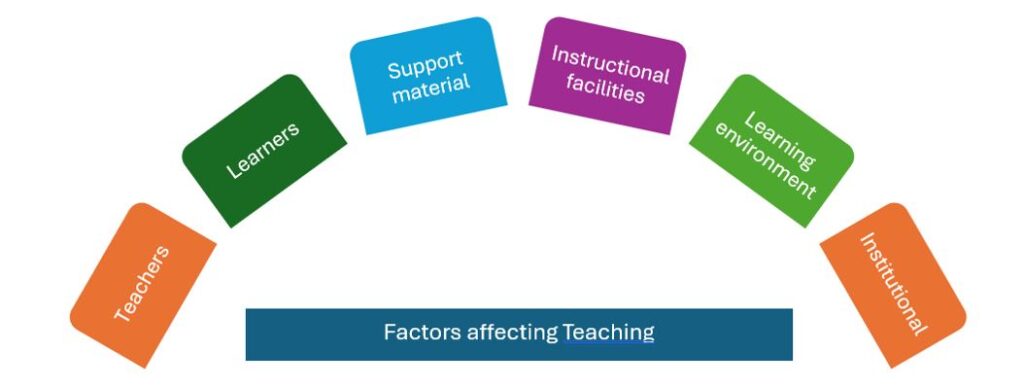Factors affecting Teaching
This is H1 Content
Effective teaching is influenced by a myriad of factors, and these elements can be categorized into 6 key areas: the teacher, the learner, the support material, the learning environment, the institutions, and the instructional facilities and support materials. These components play pivotal roles in shaping the educational experience and outcomes for both educators and students.

These factors are discussed below one by one.
1. Teacher related factors – Factors affecting teaching
Factors affecting teaching related to teachers are listed below.
- Subject Knowledge: A teacher’s deep understanding of the subject is crucial for effective teaching and leading the learning process.
- Understanding Learners: Teachers need to know how students learn at different developmental stages.
- Teaching Skills: Apart from subject knowledge, teachers require specific skills to effectively communicate and share learning experiences with students.
- Approachability: Teachers who are open, welcoming, and good listeners create a positive learning environment and lasting connections with students.
- Behavior and Personality: Teachers serve as role models, and their actions, behavior, and personality traits greatly influence students’ imitation and practice.
- Mental Health: Teachers with good mental health and adjustment positively impact the effectiveness of the teaching-learning process and serve as ideal images for students.
- Discipline: Effective teachers possess discipline skills that promote positive behavior and create an environment conducive to learning. Discipline is essential for successful learning.
2. Learner related factors – Factors affecting teaching
Factors affecting teaching related to learners are listed below.
- Learner’s well-being: The physical and mental health of learners significantly impact the teaching-learning process.
- Learner’s potential: Achievement in learning tasks depends on the learner’s innate abilities, intelligence, knowledge, interests, aptitudes, and attitudes. The quality of teaching can be assessed by the students’ questions.
- Aspiration and motivation: Learners’ level of aspiration and motivation for achievement greatly influence their learning experience.
- Life goals: Learners’ life philosophy and goals have an impact on the learning process and outcomes.
- Readiness and determination: Learner’s readiness and willpower to learn play a crucial role in their learning outcomes.
3. Support material related factors – Factors affecting teaching
Factors affecting teaching related to support material are listed below.
- Accessibility of support materials for diverse learning needs.
- Quality and relevance of support material to learning objectives.
- Variety and interactivity to cater to different learning styles.
- Authenticity and diversity to reflect learners’ backgrounds.
- Flexibility and adaptability to accommodate changes.
- Ease of use and navigation for user-friendliness.
- Feedback mechanisms for continuous improvement.
- Integration with teaching methods for effective learning.
- Teacher training and support for implementation.
4. Instructional facilities related factors – Factors affecting teaching
The factors that influence teaching in relation to instructional facilities involve various spaces utilized for formal instruction, such as classrooms, laboratories, seminar rooms, on-campus clinics, cybraries, and other facilities. The accessibility of these spaces is crucial for effective teaching, as insufficient availability can impede students’ learning experience.
5. Learning environment related factors -Factors affecting teaching
In the realm of teaching, the learning environment exerts significant influence, with several factors to consider. These include adopting an authoritative teaching style that encourages independent thinking and self-regulated learning over authoritarian approaches. Additionally, efficient management of classroom activities, use of positive reinforcement, open discussions and the provision of engaging and challenging tasks are crucial. Establishing clear rules and procedures tailored to students’ cognitive and socio-emotional needs fosters a positive classroom atmosphere, while promoting student cooperation through strategies like building positive relationships and assigning responsibilities is essential. Furthermore, collaboration and teamwork among teachers are imperative for creating a professional educational environment that enhances teaching effectiveness and student learning outcomes.
Specifically, the classroom-related factors affecting teaching are as follows.
- Classroom size and layout impacting student-teacher interaction.
- Availability of resources and materials for instructional purposes.
- Classroom environment affecting student engagement and behavior.
- Technology infrastructure and access to digital tools for learning.
- Classroom management strategies employed by the teacher.
- Physical comfort and safety within the classroom.
- Level of noise and distractions present in the classroom.
- Seating arrangement influencing student collaboration and participation.
6. Institution related factors – Factors affecting teaching
When it comes to the factors affecting teaching in relation to the institution, institutional policies play a significant role. These policies can either grant teachers’ autonomy or exert control over classroom activities. Excessive control can have a negative impact on teachers’ performance. Conversely, granting teachers autonomy to choose teaching methods and design classroom activities introduces flexibility and positively influences their teaching effectiveness.
UGC NET Questions for Practice (Factors affecting Teaching)
1.) In the context of curriculum, which of the following are correct? (08 Oct 2022 Evening)
a. Curriculum should be Modified regularly.
b. Curriculum should have theoretical concepts only.
c. Curriculum should be derived from constitutional imperatives of the country.
d. Curriculum should be made as per needs of industry & society.
e. Curriculum should be teacher-centric.
Choose the correct answer from the options given below:
(A) a, d and e only
(B) c and d only
(C) a, c and d only
(D) a, b, c and d
2.) For building a professional environment of an Educational institution: (09 July 2022 Evening)
a. A teacher must ask his/her students about other teacher’s teaching methodology.
b. A teacher must feel envious about other teacher’s professional achievements.
c. Teachers must work as a team.
d. A senior teacher must encourage junior teacher to contribute in research and other academic activities for the institution.
Choose the correct answer from the options given below:
(A) a and d only
(B) b and c only
(C) c and d only
(D) a, c and d only
3.) By which of the following means can a teacher establish a good rapport with his/her students? (20 Oct 2022 Evening)
(A) Showing authority in class.
(B) Impressing students by his/her knowledge and skill.
(C) Playing the role of a guide/facilitator with a desire to help them.
(D) Becoming a friend to the students.
4.) Effectiveness of teaching depends on: (21 Oct 2022 Evening)
(A) Qualification of teacher.
(B) Handwriting of teacher.
(C) Personality of teacher.
(D) Ability of teachers to explain the concept to the learners.
5.) Which of the following potential factors affecting teaching are related to instructional facilities and learning environment? (UGC NET 12th Nov 2020 Morning paper)
i. Praise and encouragement by teachers
ii. Non-availability of textbooks/reading materials for use
iii. Proactive moves in the interactive processes
iv. Shortage of highly qualified teachers
v. Availability of smart classes
Choose the correct answer from the following options:
(A) i, ii and iii
(B) ii, iii and v
(C) i, iv and v
(D) iii, iv and v
6.) Which of the following are the learner related factors in determining effectiveness of teaching? (UGC NET 12th Nov 2020 Evening paper)
(i) Task relevant competencies of learners
(ii) Content mastery of the teacher
(iii) Choice of teaching methods
(iv) Composition of the classroom
(v) Readiness level of student
Choose the correct answer from the options below:
(A) (ii) and (iii) only
(B) (i) and (v) only
(C) (iv) and (v) only
(D) (ii) and (v) only
7.) What is the main aim of classroom management? (UGC NET 21st Mar 2023 Morning)
(A) To keep an orderly classroom
(B) To establish the primacy of the teacher
(C) To sustain a quiet environment
(D) To maintain a positive productive learning environment
8.) Which of the following are classroom related factors that influence effectiveness of teaching?
(a) Prior task related behaviour of students
(b) Adherence to linear pattern of communication by the teacher
(c) Socio-economic status of the family to which learners belong
(d) Inappropriate use of technological resources by the teacher
(e) Cultural background of students
Choose your answer from the following options: (UGC NET 4th Dec 2019 Morning Paper)
(A) (a), (b) and (c)
(B) (b), (c) and (d)
(C) (a), (b) and (d)
(D) (c), (d) and (e)
Answers
1. C
2. C
3. C
4. D
5. B
6. B
7. D
8. C



